
Georges' (Jean-Louis Trintignant) love for his wife, Anne (Emmanuelle Riva), is tested in their old age when her failing health becomes a heavy burden.
Sony Pictures ClassicsAmour
Director: Michael HanekeGenre: DramaRunning time: 130 minutesIn French with subtitles
Rated PG-13 for mature thematic material including a disturbing act, and for brief language.
With: Jean-Louis Trintignant, Emmanuelle Riva, Isabelle Huppert
(Recommended)
We know from the outset that there's a death coming in Michael Haneke's Amour, a magisterial study of mortality that carried off the Palme d'Or at this year's Cannes Film Festival — and currently tops best-picture lists all over the world. But when we first meet Anne (Emmanuelle Riva) and Georges (Jean-Louis Trintignant), retired Paris music teachers in their 80s, they're in the pink and enjoying a piano recital given by one of Anne's former pupils.
Then, back in their book-lined apartment, as the two gossip amicably over tea about this and that, the feisty Anne drops an observation that's worth filing away.
"You're a monster sometimes," she says, "but very kind."
For a while, Haneke builds for us the well-worn routines that shape this loving couple's long marriage. Then, quickly and quietly, he shatters them. Anne begins to experience incremental fugues that she can't remember afterward, but which freak her husband out. Surgery fails and first Anne's body, then her mind, fails her too, until this accomplished, elegant woman is reduced to an incontinent infant who perks up only when her husband sings "Sur le Pont d'Avignon."
As always in a Haneke film, there's little else you could call a score, which forces us to attend to the intense process going on before us. Fresh routines come and go, along with help and hindrance from nurses of varying degrees of competence, the concierge couple from downstairs, and the couple's distracted daughter Eva (Isabelle Huppert), a musician who lives abroad and sounds the boomer clarion for "more efficient treatment" of her mother's condition.
The accretion of detail, at once pedestrian and terrifying, is what counts in Amour, and it's so telling that when Haneke adds ghoulish symbolic touches — an unexplained break-in, an intrusive pigeon rooting for seeds on the couple's floor — they feel like unnecessary icing on a cake full of horror and devotion.
A stroke and its aftermath leaves Anne largely incapacitated and puts a strain on her entire family.
Sony Pictures Classics A stroke and its aftermath leaves Anne largely incapacitated and puts a strain on her entire family.Sony Pictures Classics
A stroke and its aftermath leaves Anne largely incapacitated and puts a strain on her entire family.Sony Pictures Classics Amour makes the perfectly fine Julie Christie film Away From Her look like an ad for a swank retirement home, but it will stir your soul. If you've seen someone you love through their dying, it may burn you up — but in an illuminating way. And it's fitting that Georges and Anne are played without flinching by two actors once famous for their sensual Gallic hotness.
For a while Georges bears up with stoic patience. But the strain takes its toll, and as Anne loses all dignity, her husband, despite his early protestation that "we've always coped," seems to shrink until he's little more than a pair of haunted eyes staring out of an exhausted face.
Still, he retains enough spirit not to mince words with any would-be advisers. "Your concern is of no use to me," he tells his increasingly distraught daughter.
That might be the entire Haneke oeuvre talking. The Austrian director has made an unsparing gaze his life's calling. Goosing squeamish liberals is his favorite sport, for better and worse. His fans call him a clear-eyed observer of human depravity; his detractors see a sadist, sniggering behind his hand as he soils our most cherished moral qualms. I for one found his The Piano Teacher a trite radical-feminist treatise on twisted female sexuality, masterfully crafted and nauseating to little purpose.
At his provocative best, though — in his brilliant, gorgeous 2009 film The White Ribbon, a study of the roots of fascism in domestic tyranny, and now in Amour — Haneke implicates us in the full range of human capacity. Is Amour a great love story or is the title ironic? Let's say this: The same person who adds peach juice to a cup of water to cajole a recalcitrant patient into one sip, may also be capable of a shocking act, which in turn may or may not be a higher form of love.
Either way, without leaving this unassuming Paris apartment, the film offers a searing glimpse into old age, when there's no escaping the knowledge that we are moving though time, that time will have its way with us, and still there are choices to be made. (Recommended)
No comments:
Post a Comment